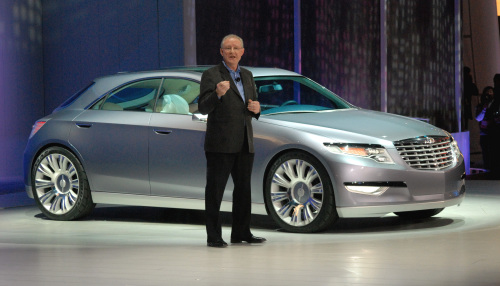
By MICHELINE MAYNARD and NICK BUNKLEY for the New York Times
Published: October 16, 2007
DETROIT, Oct. 15 — There are signs of dissent within the United Automobile Workers union over a tentative agreement with Chrysler. Union leaders at Chrysler plants approved the contract Monday, clearing the way for a vote by the company’s 45,000 workers in the United States.
But the contract did not receive unanimous approval, unlike the deal between the U.A.W. and General Motors. And it turns out that the contract, reached last Wednesday after a six-hour strike, caused a split among the union’s bargaining committee as well.
Bill Parker, the president of U.A.W. Local 1700 in suburban Detroit, who was chairman of the bargaining committee, tried unsuccessfully to persuade other union leaders to reject the pact and send bargainers back to negotiations.
Specifically, Mr. Parker and other leaders were concerned that the contract did not provide enough assurances of future work at Chrysler, which was acquired in August by the private equity firm Cerberus Capital Management.
Highlights of the contract, distributed at the meeting Monday at Cobo Center, showed that the future of Chrysler’s minivan plant outside St. Louis appears to be in doubt.
The plant survived Chrysler’s most recent plant closing announcements in February, but the union said the future of the plant was “tied to volume,” meaning minivan sales. The union will “continue to advocate for new product.” Chrysler also builds minivans in Windsor, Ontario.
Elsewhere, the highlights showed that the union had agreed that four Chrysler plants could be converted to a new lower wage and benefit standard.
Tom Littlejohn, president of Local 1268 in Belvidere, Ill., was among the union officials who opposed the contract. “I’m not going to recommend ratification,” he said.
But Bob Vorell, a committeeman at Local 573 in Cleveland, said the agreement “pretty much mirrors the deal at G.M. I don’t think it will have much problem being ratified.”
The union’s president, Ron Gettelfinger, said he was not concerned by the dissent. “We give people an opportunity to express themselves,” he said. “We’re a very democratic union.”
Mr. Gettelfinger said that the union did “the very best that we could in this set of negotiations” and that he was “prepared to go out into the field” to urge workers to vote for the contract. He said the union hoped to complete much of the voting by this weekend.
The developments on the Chrysler contract came as G.M. released details showing that the health care trust created in G.M.’s contract stands to become the company’s biggest shareholder.
The trust would hold about 16 percent of G.M. stock, because of a convertible note that the company is investing in order to establish the trust. That level would make it G.M.’s biggest institutional shareholder, surpassing the State Street Corporation, which has about 13 percent of G.M. stock.
G.M. and the U.A.W. reached agreement on their contract on Sept. 26, after a two-day strike. Workers approved the contract last week.
It established the trust, called a voluntary employee benefit association and known by its acronym VEBA, that would assume G.M.’s liability for health care benefits for G.M. workers, retirees and their families. A similar trust would be established at Chrysler under its new contract.
Today, G.M. said the liability for its U.A.W. members was about $46.7 billion.
G.M. agreed to spend $29.9 billion to finance the trust. The investment includes cash as well as a five-year, $4.37 billion convertible note, which will be placed in the trust on Jan. 1.
The note is equal to 109 million newly issued G.M. shares at $40 a share. G.M. can convert the note after three years, or if G.M.’s share price reaches $48. G.M. stock fell $1.53, to $41.11.
The trust would be run by an independent board that is expected to include union and company advisers, although G.M. said it might not take part if that affects the accounting for its liability.
The chief financial officer of G.M., Frederick A. Henderson, said the VEBA “will be a very large shareholder of General Motors.” He said he would expect trustees to “vote the stock in the same proportion as all shareholders.”